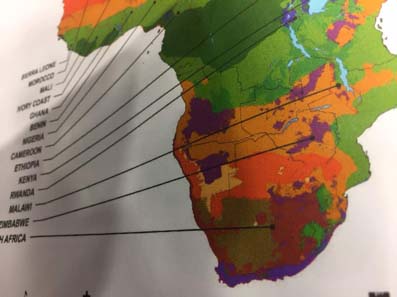NAPAS: Malawi Value Chain Studies at the World Banks’ ICABR Conference in DC
NAPAS: Malawi published six value chain studies to inform Malawi's policy makers and investors: Cassava, groundnuts, macademia, pigoen pea, potato and tea.
Six of the 12 value chain studies that the New Alliance Policy Acceleration support Project (NAPAS: Malawi) conducted recently got international attention as the studies were accepted for presentation at the 2018 International Consortium on Applied Bioeconomy Research Conference (ICABR) on “Disruptive Innovations, Value Chains and Rural Development” that was held at the World Bank Headquarters in Washington DC, from June 12–15, 2018.
The 12 value chain studies which include, tea, coffee, macadamia, groundnuts, pigeon peas, banana, tomatoes, mangoes, and roots and tubers (cocoyam, cassava, Irish potato and sweet potato) were conducted against the backdrop of the Government of Malawi’s (GoM) approval of the National Agriculture Policy (NAP) in September 2016. The NAP is the overarching policy for the agriculture sector of Malawi. Following adoption of the NAP, the GOM embarked on designing its implementation plan, the National Agriculture Investment Plan (NAIP) that also happens to be a predecessor of the Agriculture Sector Wide Approach (ASWAp) I that run from 2011–2016.
The NAP spells out the vision for a transformed agriculture sector as a key engine for economic growth and development of the country. It aims “to achieve sustainable agricultural transformation that will result in significant growth of the agricultural sector, expanding incomes for farm households, improved food and nutrition security for all Malawians, and increased agricultural exports.” In order to achieve this goal, the sector will have to make strategic investments in various value chains that have the potential for sustainable and inclusive economic growth.
The NAPAS: Malawi Project produced the value chain studies to guide agricultural investments during development and implementation of the NAIP.
The 2018 ICABR Conference focused on the impact of new value chains and technology on agribusiness and farmers and their capacity to implement innovation, and the policy and institutional implications of transforming value chains and the agri-food system. About 500 Participants including academics, government experts, civil society organizations, private sector representatives and representatives of other international organizations participated to showcase and present frontier knowledge on these issues. The work that NAPAS: Malawi produced that was accepted for presentation at the conference, helped put Malawi on the map at the conference.
The following papers and posters were presented:
- Is the Future of Malawis’ Pigeon Pea Industry at the Mercy of India? An Analysis of Malawi’s Pigeon Pea Value Chain by Flora Janet Nankhuni, Nathalie Me-Nsope, Joseph Samuel Kanyamuka and Christone Jeremiah Nyondo. The presentation showed the increasing production and productivity of the pigeon pea in Malawi that recently faced a challenge due to domestic price decreases partly caused by India’s imposition of a ban to imports of pigeon pea following over production in the country. However, the sharp decrease in price has not yet caused a sharp decrease in production and productivity, probably due to the fact that Malawian pigeon pea producers are mostly subsistence and are not as vulnerable to price shocks.
- Analysis of the Value Chains for Root and Tuber crops in Malawi: The Case of Cassava by Joseph Samuel Kanyamuka, Joseph Kuyamba Dzanja and Flora Janet Nankhuni. This presentation highlighted the increasing importance and rising demand of cassava and associated products due to maize’s vulnerability to climate change impacts and increasing urbanization in the country. The presentation highlighted the limited availability and access to quality cassava planting materials coupled with limited research and extension as some of the major factors hindering the growth of the cassava sub-sector in Malawi. Agro processing of the cassava is underdeveloped despite opportunities to process high quality cassava flour that can be used in the confectionary and brewery industries. Recommendations were provided for developing the cassava value chain to take full advantage of the existing opportunities.
- Opportunities to Enhance the Competitiveness of Malawi’s Tea Industry: Evidence from an Analysis of the Value Chain by Justin P. Du Toit, Flora Janet Nankhuni and Joseph Samuel Kanyamuka. The presentation highlighted the need to incorporate smallholders into the value chain and for government to explore which other areas in Malawi are suitable for tea production. New investments to replace aging tea plantations are required to make Malawi competitive in the production of tea, that is currently facing productivity and market price constraints.
- Is There Scope for Commercially Up scaling the Groundnut Value Chain in Malawi? A Systematic Analysis of Groundnut Production, Processing and Marketing in Malawi. by Flora Janet Nankhuni, Nathalie Me-Nsope, Christone Jeremiah Nyondo and Joseph Kanyamuka (a poster presentation).
- Analysis of the Value Chains for Root and Tuber Crops in Malawi: The Case of Irish Potatoes in Malawi by Joseph Kuyamba Dzanja, Joseph Samuel Kanyamuka and Flora Janet Nankhuni (a poster presentation).
- Can Malawi increase its Share on the Global Macadamia Market? Opportunities and Threats to the Expansion of Malawi Industry by Justin Du Toit, Flora Janet Nankhuni and Joseph Samuel Kanyamuka.

Malawi on the map, Pic by Dr. Christone Nyondo
Acknowledgments:
Four researchers attended and presented at the conference: Dr. Christone Jeremiah Nyondo (NAPAS: Malawi Analyst); Mr. Joseph Samuel Kanyamuka (NAPAS: Malawi Analyst); Justin Du Toit of Vuna Agribusiness, Durban, South Africa (NAPAS:Malawi Consultant); and Dr. Joseph K. Dzanja of Lilongwe University of Agriculture and Natural Resources (LUANAR) (NAPAS:Malawi Consultant). The team is grateful for the financial support that the United States Agency for International Development (USAID/Malawi) and the Sustainable Trade Initiative (IDH) provided to enable NAPAS: Malawi conduct these studies for the Government of Malawi. The team is also grateful for the OCP Group and the World Bank for providing the support that enabled the NAPAS: Malawi Analysts and Consultants to attend the Conference.



 Print
Print Email
Email




